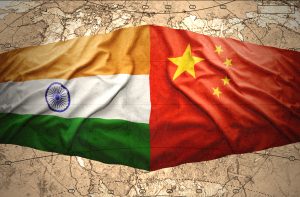2023 was a year of disappointed expectations in China-India relations. The long-expected thaw between the two sides did not materialize and the standoff on their disputed border, which began when a violent military crisis erupted in 2020, continued.
Nevertheless, 2023 saw some stabilization in relations, which offers promise for the future. Not only did the two sides discuss resolving the border standoff and signal interest in restoring some normalcy in their relations, but their heavily militarized border remained mostly quiet in the last year.
The spring and summer of 2023 were marked by expectations for a thaw in China-India relations that would stabilize the border, bring relations back to normal, and allow some cooperation between Beijing and Delhi. With momentum from the 2022 handshake and brief exchange between Indian Prime Minister Narendra Modi and Chinese President Xi Jinping at the G-20 summit in Indonesia, disengagement in five areas on the border, and the fast and quiet resolution of the December 2022 border clash at Yangtse, the background seemed favorable.
Meetings between the defense and foreign ministers of the two sides as part of India’s hosting of the Shanghai Cooperation Organization allowed discussion of border tensions, while the 19th round of the corps commander-level talks produced an agreement that the two sides should resolve the remaining issues on which they disagreed “in an expeditious manner.”
The momentum for a breakthrough grew as India’s National Security Advisor Ajit Doval and China’s Foreign Minister Wang Yi held talks before their respective leaders were scheduled to meet and worked on disengagement in the two remaining areas of immediate tensions on the border. With The Economist proclaiming a “detente” between China and India, Xi and Modi discussed relations in person at the BRICS summit in Johannesburg and agreed “to intensify efforts at expeditious disengagement and de-escalation,” according to the Indian side.
However, the emerging thaw did not materialize. Xi did not attend the G-20 summit in Delhi in September and the border talks have not yet produced a breakthrough. The most likely immediate reason for this failed thaw was that negotiations did not yield an agreement on complete disengagement between the two armies on the border, the designation of buffer zones between them, and the establishment of positions to withdraw to.
At a deeper level, the unsuccessful thaw highlights the fundamental issues that have soured China-India relations, including the India-U.S. partnership to counter Beijing, the military race between the two sides, and their growing competition in South Asia as China makes inroads in Bhutan and the Maldives. More broadly, the competition between China and India had generated deepening mistrust, a mistrust that was further exacerbated in 2023 as India surpassed China as the world’s most populous nation.
Just as important, the strategies of both sides toward their relationship make a breakthrough more difficult. New Delhi has decided not to unfreeze relations until China makes major concessions on the border and preferably returns to the pre-2020 status quo. Beijing has adopted a dual approach of pressuring India on the border and in South Asia and engaging it simultaneously for the purpose of restoring relations. The Chinese goal is to make India, pressured by Chinese actions and tired of the unsustainable status quo, normalize relations either without major Chinese concessions on the border or at a very low price for Beijing. Both strategies make negotiations a test of wills and reduce the room for compromise.
All is not bad news, however. 2023 also saw a continuation of the recent trend toward stabilization of China-India relations. Most importantly, the disputed border has remained relatively quiet, with no further escalation or clashes during the last year, in sharp contrast to the three previous years. Although the tense situation between the two militaries deployed close to the border persists – particularly in the Western Sector, where a military standoff continues – this relative calm around the Line of Actual Control, the de facto border, indicates that both Beijing and New Delhi seek to deescalate the border situation and overcome the military and political crisis that erupted in 2020.
Moreover, the two sides are actively talking to each other and discussing their troubled relationship and the tense situation on the disputed border. This has been happening both between the military and diplomatic establishments of the two countries, and between their top leaders. Negotiations on stabilizing the border itself continue, most recently with the 28th round of talks that form part of the Working Mechanism for Consultation and Coordination on India-China Border Affairs. While negotiations do not equal progress, their intensification in the last year and the language of the official statements of both sides suggests that there is building momentum toward stabilizing the border and restoring some normalcy in relations.
All this offers some hope for improving relations in 2024. Apart from the momentum in negotiations, it seems that the international situation is more favorable to normalizing China-India relations, with the recent straining of relations between India and the United States, a Chinese push to improve its international position through greater engagement, and a limited thaw between Beijing and Washington.
Of course, such an improvement in relations is likely to happen only after the Indian parliamentary elections this year. Even if it happens, which is not certain, it would be only a partial return to normalcy. It would be extremely difficult to turn the clock back to 2019 as the events of the last four years have deeply affected relations and intensified Sino-Indian rivalry.
In sum, 2023 was a year in which many expected a thaw in China-India relations but were disappointed. However, the outgoing year also had another side; it witnessed a further stabilization of relations and accelerated negotiations, both of which generated some positive momentum for 2024. Will the new year see the turning of a new page in China-India relations or just more disappointment?
































